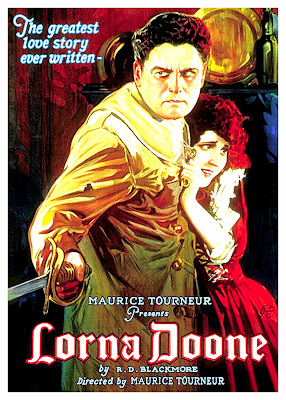Lorna Doone
1869 Classic by R.D. Blackmore
Was lucky enough to be given the Penguin Classics edition prepared by R.D.Madison and Michelle Allen, from 2005. Drawn on their introduction for biographical information along with the Victorian Web entry.
Poster for 1922 silent movie version
I was wondering if anyone can name another novel by Richard Doderidge Blackmore (1825 -1900) besides Lorna Doone? Let alone one of his poems. But 'Lorna Doone' has been continually in print since 1869, has inspired 10 filmed versions, at least one TV series, and a musical. In fact the first movie version was Maurice Tourner's silent film of 1922. Set in the reign of Charles II and James II, the novel is centred largely around Exmoor, Devon. And the stunning portrayal of local landscape, dialect, wildlife and customs have added a great deal to the book's charm, and probably attracted plenty of visitors to the region. R.D Blackmore himself did not live in Devon during his adult life, though his ancestors were from the county.
( Source: Victorian Web entry)
'Lorna Doone' is a romance above all . Ultimately it takes a 'Romeo and Juliet' scenario where an affair between a young man ( John Ridd) and a young woman ( Lorna Doone) from warring families plays out, but this time with a happy ending. Passions and obsessions are just about kept under control, The Doones live in fortified valley, and terrorise local hard working families, killing John Ridd's father. They are disinherited nobility, ferocious, lawless, though nominally Catholic, they join the Monmouth Rebellion in 1685 for opportunist motives. Some seven hundred pages later, order is restored, chaos and rebellion defeated. There are a couple of customary literary devices such as the benign witch who for some reason escapes persecution, and the sudden discovery of a massive life changing inheritance.
John Ridd successfully defies many challenges to keep his farm, an extended family, servants, afloat- R.D. Blackmore was a failed fruit farmer. Ridd is a champion wrestler, R.D. Blackmore never quite got over being horribly bullied and savagely beaten at school. Ridd is a man of action, shows honour and courage, instinctively knows what is the right course of action to take, Exmoor for all it fogs, snowy winters which last months, treacherous waterfalls, hidden marshes, its bleakness, is where Ridd belongs. He is stoic when facing the challenges of the natural world.
When Ridd is forced to attend high court in London, even encountering Judge Jeffreys well before the Blood Assizes, he is frustrated by the slow moving, corrupt, and false pace of the Judiciary. Not surprising to learn the R.D.Blackmore trained for the bar, after studying at Oxford. When the Duke of Monmouth lands, Ridd just knows that loyalty to the Crown is important and the Rebellion will end in tears. He doesn't need to pontificate. In the same way, Ridd knows that Judge Jeffreys treatment of rebels during the Bloody Assizes is just wrong. Ridd can fight well with fists, pistol or sword,and longs to storm and destroy the Doones' valley, yet is horrified by seeing the aftermath of the battle of Sedgemoor, where hundreds of men are dying of wounds in sheer agony.
Lorna herself also functions on instinct and emotion operating on a love conquers all basis, Family loyalty, differences in social status and even in religious upbringing between her and Ridd, are of secondary value. And her defiance of convention is rewarded, there is not 'Tess of the Durbervilles' tragic ending for defying social mores.
Though a delightful read, it is hard to gauge the novel's value as history. It is a healthy reminder that many people in East Devon avoided joining Monmouth's uprising. R.D.Blackmore shows the problems facing attempts to confront disorder ...the rivalry between Devon and Somerset militias is a major obstacle in this respect. Though the most famous novel to depict the battle of Sedgemoor, the whole Monmouth Rebellion is a minor theme in what is a very long book. In fact several dramatisations of the novel leave out the Sedgemoor scence.
I have written more about Lorna Doone and the Battle of Sedgemoor for the 1685 Monmouth Rebellion blog
In fact the novels is more of an interesting record of how a Victorian intellectual viewed the 17th century West Country, living some distance away.Though R.D. Blackmore revered the bleak beauty of Exmoor he seemed fascinated but partly fearful of the turbulent world of 17th century, where Doone like disorder can flourish for so long. The 'men of action' who can take over in world where authority is hard to enforce can either be essentially honourable like John Ridd or totally amoral like his arch opponent Carver Doone. Above all it is a comforting read, re-enforcing the aspirations and values of the mid 19th century, not the sort of book that changes lives. And certainly a great asset in attracting tourists to Exmoor.
Other Blogs from Michael Bully
World war 2 Poetry No long active
13th century history No longer active



Comments
Post a Comment